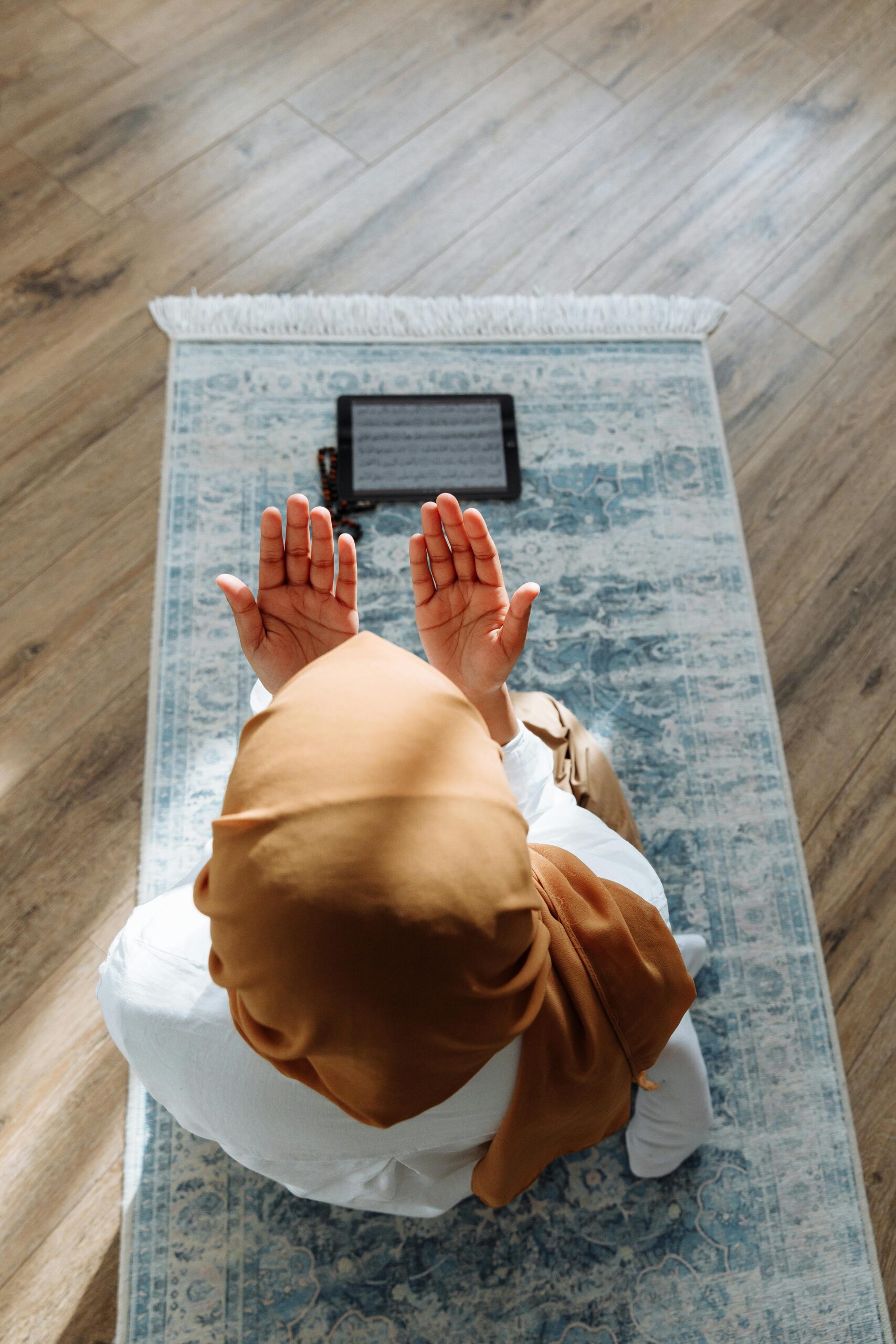Prayer, known as Salah (الصلاة), is a foundational pillar of Islam and stands as the most significant act of worship after the declaration of faith (Shahada). It serves as a direct, obligatory, and personal communion between a Muslim and Allah (God), performed five times a day at specific, divinely appointed times.
The Five Obligatory Daily Prayers
Muslims are commanded to perform five obligatory prayers at specific intervals throughout the day, determined by the position of the sun:
- Fajr (الفجر): The Dawn Prayer, performed before sunrise.
- Dhuhr (الظهر): The Noon Prayer, performed after the sun reaches its zenith.
- Asr (العصر): The Afternoon Prayer, performed in the late afternoon before sunset.
- Maghrib (المغرب): The Sunset Prayer, performed immediately after sunset.
- Isha (العشاء): The Night Prayer, performed after dusk until just before dawn.
Prayer times for Nozha 2, Cairo, Egypt (as of Friday, June 13, 2025):
- Fajr: ~3:08 AM
- Sunrise: ~4:53 AM
- Dhuhr: ~11:55 AM
- Asr: ~3:31 PM
- Maghrib: ~6:57 PM
- Isha: ~8:30 PM (Note: These are approximate times and are subject to slight daily variations based on astronomical calculations and local announcements. Always refer to a reliable local prayer time source or app for precision.)
Essential Pre-requisites for Prayer (Salah)
Before standing for Salah, a Muslim must ensure certain conditions are met to validate the prayer:
-
Purity (Taharah – الطهارة):
- Wudu (الوضوء – Partial Ablution): A ritual washing of specific body parts (face, hands and forearms up to the elbows, wiping the head, and feet up to the ankles) with clean water. It is required for minor impurities.
- Ghusl (الغسل – Full Ablution): A full body wash required after major impurities (e.g., after sexual intercourse, menstruation, or postpartum bleeding).
- Tayammum (التيمم – Dry Ablution): A symbolic purification using clean earth or dust, performed when water is unavailable or its use is harmful.
- Ensuring the cleanliness of one’s body, clothing, and the specific place of prayer from impurities.
-
Facing the Qibla (القبلة): Directing one’s face towards the Kaaba in Mecca, Saudi Arabia. This symbolizes the unity of the Muslim Ummah (global community) as they turn to a single point in worship.
-
Intention (Niyyah – النية): Having the sincere intention in the heart to perform the specific prayer (e.g., Fajr, Dhuhr) for the sake of Allah alone. This intention does not need to be verbalized.
-
Covering Awrah (العورة): Covering the parts of the body that must be concealed. For men, this is typically from the navel to the knees. For women, it is the entire body except the face and hands.
-
Entering the Prayer Time: Ensuring that the prayer is performed within its prescribed time window, as prayers outside their designated times are generally not valid without a valid Islamic excuse.
How Prayer (Salah) is Performed (Basic Structure – Rak’ah by Rak’ah)
Salah involves a precise sequence of physical postures and verbal recitations, each imbued with spiritual significance, symbolizing humility, reverence, and submission to Allah. Each prayer consists of a specific number of units called Rak’ahs (ركعة).
Here’s a simplified overview of the actions within a single Rak’ah:
-
Standing (Qiyam – القيام):
- Face the Qibla.
- Make the Niyyah (intention) silently in your heart.
- Raise hands to the ears (for men) or shoulders (for women) and say “Allahu Akbar” (الله أكبر – Allah is the Greatest). This is the Takbirat al-Ihram, which formally begins the prayer and signifies detaching from worldly matters.
- Place the right hand over the left hand on the chest or below the navel.
- Recite Surah Al-Fatiha (the opening chapter of the Quran), followed by another short Surah or verses from the Quran. These recitations are typically silent in Dhuhr and Asr prayers, and audible in Fajr, Maghrib, and Isha (at least the first two Rak’ahs).
-
Bowing (Ruku’ – الركوع):
- Say “Allahu Akbar” and bow from the waist, placing hands on the knees with fingers spread, keeping the back straight and parallel to the ground.
- Recite “Subhana Rabbiyal Azeem” (سبحان ربي العظيم – Glory be to my Lord, the Most Great) at least three times.
-
Standing Up from Ruku’ (I’tidal – الاعتدال):
- While rising from bowing, say “Sami’ Allahu liman hamidah” (سمع الله لمن حمده – Allah hears those who praises Him).
- Once fully upright, say “Rabbana walakal Hamd” (ربنا ولك الحمد – Our Lord, to You be all praise).
-
Prostrating (Sujud – السجود):
- Say “Allahu Akbar” and go down into prostration. Your forehead, nose, palms of both hands, knees, and the tips of your toes should all be touching the ground. This is the posture of ultimate humility.
- Recite “Subhana Rabbiyal A’la” (سبحان ربي الأعلى – Glory be to my Lord, the Most High) at least three times.
-
Sitting Between Two Prostrations (Julus – الجلوس):
- Say “Allahu Akbar” and rise from the first prostration to a sitting position (typically resting on the left foot, with the right foot upright).
- Recite “Rabbighfir li” (رب اغفر لي – My Lord, forgive me), and optionally other supplications like “warhamni, wajburni, warfa’ni, warzuqni, wahdini, wa ‘afini, wa’fu ‘anni.” (have mercy on me, support me, elevate me, provide for me, guide me, grant me health, and pardon me.)
-
Second Prostration (Sujud):
- Say “Allahu Akbar” and perform a second prostration, exactly like the first.
- Recite “Subhana Rabbiyal A’la” three times.
This sequence completes one Rak’ah. The number of Rak’ahs varies for each of the five daily prayers: Fajr (2), Dhuhr (4), Asr (4), Maghrib (3), Isha (4).
- Tashahhud (التشهد): After every second Rak’ah, the worshipper sits and recites the Tashahhud, which is a testimony of faith, praises to Allah, and greetings to the Prophet.
- Salawat (الصلاة الإبراهيمية): In the final Tashahhud of any prayer, the Salawat (blessings upon Prophet Muhammad and Prophet Ibrahim) is added.
- Supplication (Dua): Before concluding, one can make personal supplications (Dua).
- Tasleem (التسليم): The prayer concludes by turning the head to the right and then to the left, saying “Assalamu Alaykum wa Rahmatullah” (السلام عليكم ورحمة الله – Peace and Mercy of Allah be upon you), greeting the angels and fellow worshippers.
The Significance of Prayer in Islam (Salah): A Pillar of Islam

عن عبد الله بن عمر رضي الله عنهما قال: سمعت رسول الله صلى الله عليه وسلم يقول: “بني الإسلام على خمس: شهادة أن لا إله إلا الله وأن محمدا رسول الله، وإقام الصلاة، وإيتاء الزكاة، وصوم رمضان، وحج البيت من استطاع إليه سبيلاً”
Muslims perform Salah five times a day, at specific times throughout the day. These prayers serve as a constant reminder of Allah’s presence and provide a framework for a disciplined and mindful life. Here’s what makes Salah so important:
- Direct Connection with Allah (SWT): Prayer is a direct conversation with God, a way to express gratitude, seek forgiveness, and ask for guidance.
Surah Al-Baqarah (2):186: “And when My servants ask you, [O Muhammad], about Me, indeed I am near. I respond to the الدعاء (du’aa – supplication) of the supplicant when he calls upon Me. So let them respond to Me [by obedience] and have faith in Me that they may be successful.”
Hadith Qudsi: “I am as close to My servant as his hearing and his seeing. And I am with him wherever he is. So if he supplicates Me, I answer him. And if he seeks My help, I help him.” - Spiritual Renewal: Salah offers a regular pause in our busy lives, allowing us to refocus and reconnect with our inner selves and faith.
- Discipline and Mindfulness: Performing Salah at set times throughout the day instills discipline and promotes mindfulness in every aspect of life.
Surah Al-A’raf (7):205: “And establish prayer at the two ends of the day and at the close of night. Indeed, good deeds dispel evil deeds. This is a reminder for those who remember.” - Community and Unity: Muslims often pray together in mosques, fostering a sense of community and shared faith.
The Steps of Prayer in Islam (Salah): A Simplified Guide
While there are specific details involved, here’s a basic overview of the steps in prayer:
- Preparation (Wudu): Cleanliness is essential. Muslims perform Wudu, a ritual washing of the face, hands, arms, head, and feet, before prayer.
سورة المائدة (5):6:“يَا أَيُّهَا الَّذِينَ آمَنُوا إِذَا قُمْتُمْ إِلَى الصَّلَاةِ فَاغْسِلُوا وُجُوهَكُمْ وَأَيْدِيَكُمْ إِلَى الْمَرَافِقِ وَامْسَحُوا بِرُءُوسِكُمْ وَأَرْجُلَكُمْ إِلَى الْكَعْبَيْنِ ۚ وَإِنْ كُنْتُمْ جُنُبًا فَاطَّهَّرُوا ۚ وَإِنْ كُنْتُمْ مَرْضَىٰ أَوْ عَلَىٰ سَفَرٍ أَوْ جَاءَ أَحَدٌ مِنْكُمْ مِنَ الْغَائِطِ أَوْ لَامَسْتُمُ النِّسَاءَ فَلَمْ تَجِدُوا مَاءً فَتَيَمَّمُوا صَعِيدًا طَيِّبًا فَامْسَحُوا بِوُجُوهِكُمْ وَأَيْدِيكُمْ ۖ مَا يُرِيدُ اللَّهُ لِيَجْعَلَ عَلَيْكُمْ مِنْ حَرَجٍ وَلَكِنْ يُرِيدُ لِيُطَهِّرَكُمْ وَلِيُتِمَّ نِعْمَتَهُ عَلَيْكُمْ لَعَلَّكُمْ تَشْكُرُونَ”
- Intention (Niyyah): Set your intention to perform a specific prayer.
- Takbir (Allahu Akbar): Raise your hands and say “Allahu Akbar” (God is the Greatest) to begin the prayer.
- Recitation (Qira’ah): Recite verses from the Quran, starting with Surah Al-Fatihah.
- Ruku’ (Bowing): Bend at the waist, placing your hands on your knees, and say specific phrases glorifying Allah (SWT).
- Straightening Up (I’tidal): Stand straight after bowing and say “Sami’Allahu Liman Hamidah” (Allah hears those who praise Him).
- Sujud (Prostration): Fall to the ground on your hands and knees, with your forehead touching the ground. Recite specific phrases praising Allah (SWT).
-
Sitting Between Prostrations (Jalsa): Sit back on your heels and say specific phrases glorifying Allah (SWT).
Second Prostration (Sujud): Repeat - Tashahhud (Sitting in Tranquility): Sit on your left foot with your right foot tucked under, and recite the Tashahhud, a specific prayer.
- Salutation (Taslim): Turn your head right and say “As-salamu alaykum wa rahmatullahi wa barakatuhu” (Peace, mercy, and blessings of Allah be upon you) twice, then turn your head left and repeat the same salutation.
- Supplication (Dua): Raise your hands and offer personal supplications to Allah (SWT) after the prayer.
Learning Prayer in Islam (Salah): The Role of a Quran Academy
Learning the proper way to perform Salah can be daunting, especially for beginners. This is where a Quran Academy can be invaluable. Here’s how they can assist you
Structured Learning: Quran Academy offer well-structured courses that guide you step-by-step through the process of Salah, ensuring you understand the meaning and purpose behind each action.
Qualified Instructors: Experienced teachers, often native Arabic speakers, can provide clear explanations and demonstrations of proper prayer techniques.
Personalized Attention: Whether you’re a complete beginner or need to refine your existing practice, a Quran Academy can cater to your individual needs and learning style.
Interactive Learning: Many academies offer interactive learning environments, allowing you to practice and receive feedback in a supportive setting.
Cultural Context: Learning Salah within a Quran Academy can help you understand the cultural and spiritual significance of this practice in Islam.
Benefits of Learning Prayer from a Quran Academy
Confident and Accurate Prayer: A Quran Academy ensures you learn Salah correctly, fostering a deeper connection with your faith.
Understanding the Meaning: Beyond just the actions, you’ll gain a deeper understanding of the words and phrases recited during prayer.
Building Confidence: Learning in a supportive environme
Visit Our Website Explore our website from here to learn more about our courses, teachers, and teaching methodology.
Contact Us Feel free to contact us with any questions you may have. Our friendly team is happy to guide you towards the perfect course fit. Contact Us from here
Embark on Your Quranic Journey Enroll in your chosen course and begin your enriching journey towards mastering Quran recitation and deepening your connection with the Holy Book.
Book Free Trial Class
Learn more about the month of Ramadan here
Read about the Prophet Muhammad from here
Read about How to memorize Quran in Ramadan? from here




Major thankies for the blog.Really looking forward to read more. Great.